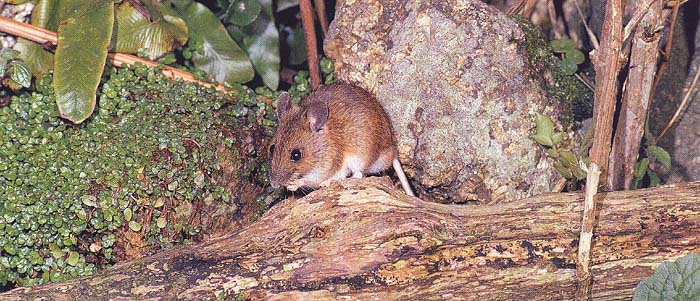
The wood mouse will breed throughout the year in mild weather. Photo: JB and S Bottomley
Spring, a time when everything jumps into action! But have some mammals been jumping the gun? With global warming giving us wetter, milder winters, are our hibernating mammals waking up too early to find there is very little in the way of food around for them to fill their hungry bellies?
As well as having to adapt to warmer winters, our mammals
may also have to adapt to drier, hotter summers and possibly changes in habitat. This could result in changes in population densities and distribution or even lead to extinctions. Although we can try and predict the possible effects of climate change there are still no definite answers.
This is one of the key reasons for recording what we see, and when
we see it. By doing this we can monitor and detect changes in population distributions and densities and act accordingly to conserve our mammals.
For information on how to record mammals and get involved with the Cornwall Mammal Group, please contact lan Bennallick (01872) 240777 ext.226.
Alex Howie
Revision of the licensing procedures under the Habitats Directive affecting European protected species
Until recently, whenever churches required a survey prior to undertaking any building work that might affect bats, a Bat Warden (licensed by English Nature) undertook the work as a volunteer. English Nature would provide statutory advice following this survey. However, changes to the licensing policy mean that anyone carrying out work to churches that might affect a European protected species such as bats, must now apply for a licence from the Department for Environment Food and Rural Affairs (DEFRA). A DEFRA licence requires that a full survey be undertaken to include mitigation
measures and recommendations on monitoring. The report will also look at the impact of the work at a site level and in a wider context. The costs for such a survey report and licence application start at about £700.
The financial implications for small rural churches needing minor roof repairs could be a concern. Fortunately, in the case of church buildings, English Nature is still willing to offer the initial survey using a Bat Warden to establish the extent that the proposed work will affect any bats. This survey will be free as before. If it is clear that the proposed work, such as in the case of re-roofing, will incur disturbance to the bats the Wardens will recommend that a DEFRA licence be applied for. However, if the proposed work is
small-scale or unlikely to be detrimental to the bats and can be scheduled for the months that the bats are absent, the requirement for a licence may be avoided. Obviously if there are no signs of bats, the parish will be spared considerable expense as they will not need to pursue the matter further.
English Nature has stressed that this flexibility when interpreting the need for a DEFRA licence relies upon good will on both sides. If a series of small building repairs lead to more major works, the initial decision to apply for a licence may need to be re-examined. English Nature reviews its advice constantly and should the system be abused it may need to tighten up on its recommendations.
Carol Simpson